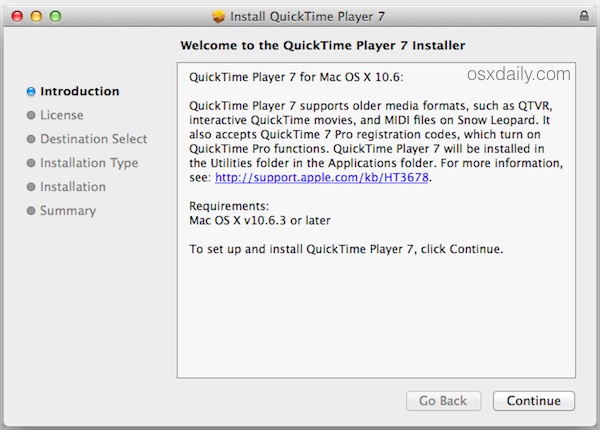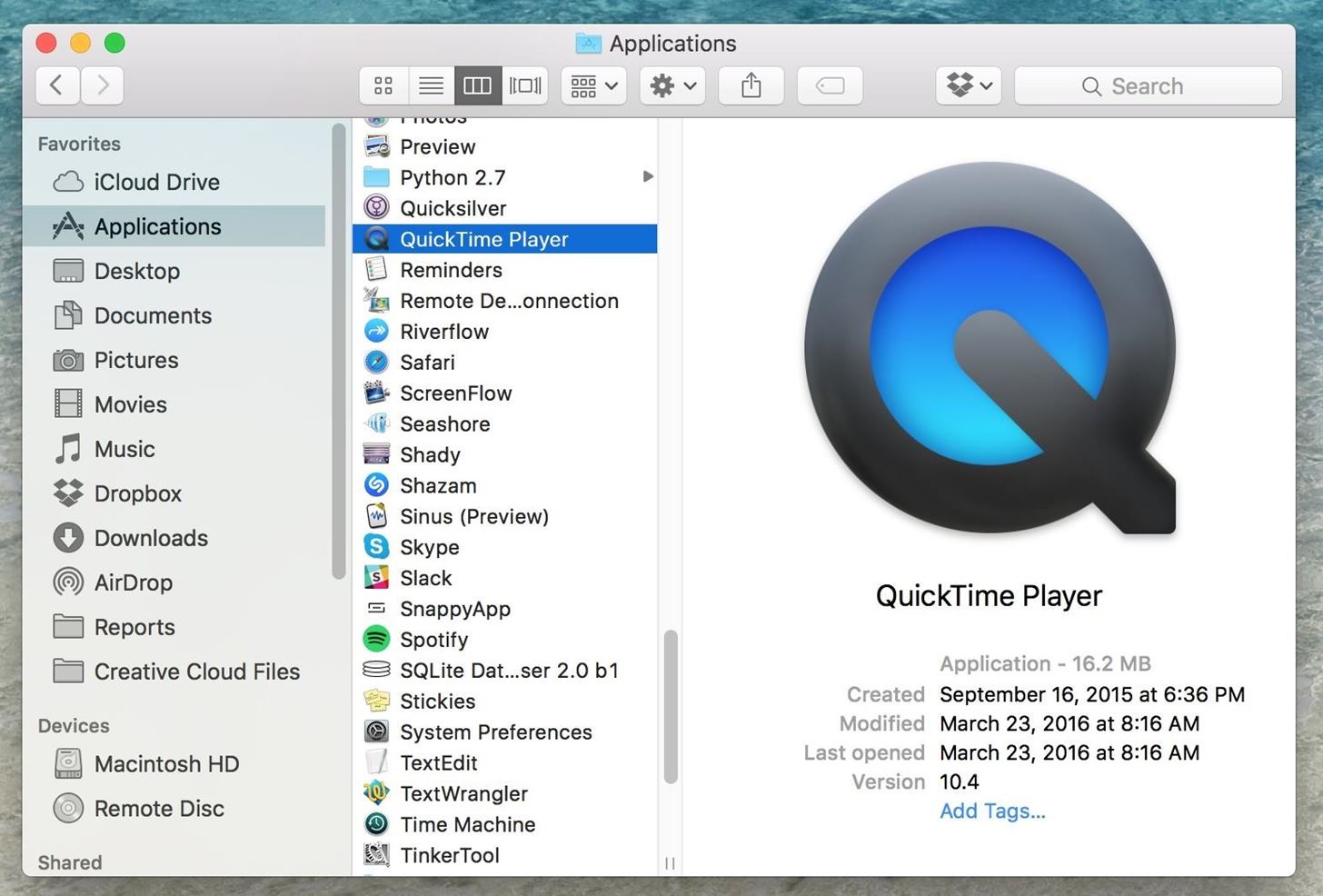


- #Quicktime for mac os 10.13.6 mac os x
- #Quicktime for mac os 10.13.6 install
- #Quicktime for mac os 10.13.6 upgrade
- #Quicktime for mac os 10.13.6 full
- #Quicktime for mac os 10.13.6 software
Similarly, use high bitrates (and possibly additional high-quality settings) when converting to H.264 (which is likely to be used for most conversions, if for no other reason than usually being the default). Generally, save images as compressed TIFF or PNG (which are lossless formats), or at least set the JPEG quality slider as close to the max as possible. This is not easy to deal with, and even more so if batch conversions are employed. containing noise, banding, or compression artifacts from the original format) are susceptible to visible degradation. Especially with images or videos that are already of low quality (e. g. Until the release of 10.15, it’s not clear how successful that might be, but I’m sure that VMWare will be working very hard on it.Įvery user converting media files should note that virtually all methods available will result in a lossy conversion. If you know of one, please let us know.įinally, for those who become marooned in macOS 10.15 but require access to old formats, one solution may be to run Mojave in a Virtual Machine, such as VMWare. Because QuickTime X uses a different mechanism to incorporate codecs, I can’t see any way of discovering exactly which formats will remain supported. Here, that means the loss of a total of 42 codecs. Use this to scan the classic QuickTime folders of /Library/QuickTime and /System/Library/QuickTime, and you’ll see that each and every codec in them is 32-bit only, thus doomed. One thorough and reliable way to identify all types of code which remain 32-bit only is my free app 32-bitCheck, available from Downloads above. Most, perhaps all, of those listed in the Components section are provided in 32-bit form and will be unavailable in macOS 10.15, but there doesn’t appear to be any listing of formats which are supported in QuickTime X.
#Quicktime for mac os 10.13.6 software
They aren’t included in Mojave’s System Information under its Legacy Software section, which only seems to cover apps and similar bundles. Unfortunately, there’s no system-level means of checking which video, audio and still image formats remain reliant on 32-bit components such as codecs. It’s possible that some vendors may port codecs or other tools to 10.15 to support some of them in the future, although this looks unlikely at present. Most popular still image and audio formats will also continue to be supported.Īmong those which won’t be supported under macOS 10.15 are several Avid formats, Cinepak, DivX, Flash Video, FlashPix, GlueTools codecs, JPEG 2000, Motion JPEG A and B, Perian codecs (MPEG-4, DivX, and more), RealVideo, several Sorensons, and Windows Media Video (WMV) 7, 8, 9. Its matching article covering iMovie gives comparable information for that app.Īmong those video formats which will still be supported in 10.15 are Apple Intermediate codec, Apple ProRes, Apple ProRes RAW, AVCHD, DV, H.264, and XDCAM.
#Quicktime for mac os 10.13.6 full
Those files which use formats and codecs not supported in macOS 10.15 are likely to become unusable when you have upgraded to that in the autumn/fall.Īpple provides detailed information with a list of supported formats, lists some of those which are being dropped, and provides full instructions for conversion.
#Quicktime for mac os 10.13.6 upgrade
Mojave currently includes legacy support for QuickTime 7, so if you have old media files which rely on that and its codecs, now is the time to convert those to formats which will be supported in macOS 10.15.Īpple has released updates to iMovie, Final Cut Pro, Motion and Compressor which “detect media files that may be incompatible with future versions of macOS after Mojave and convert them to compatible formats.” You should upgrade to those and check your old media files in the coming weeks. Get it for PowerPC or Intel.Apple has now confirmed that macOS 10.15 won’t support 32-bit software, which includes QuickTime 7 and all media formats and codecs relying on it. Note that support ended for all releases listed below and hence they won't receive any further updates. You can find recommendations for the respective operating system version below. We provide older releases for users who wish to deploy our software on legacy releases of Mac OS X.
#Quicktime for mac os 10.13.6 mac os x
Older versions of Mac OS X and VLC media player The last version is 3.0.4 and can be found here. Support for NPAPI plugins was removed from all modern web browsers, so VLC's plugin is no longer maintained.
#Quicktime for mac os 10.13.6 install
You can also choose to install a Universal Binary.

If you need help in finding the correct package matching your Mac's processor architecture, please see this official support document by Apple. Note that the first generation of Intel-based Macs equipped with Core Solo or Core Duo processors is no longer supported. Previous devices are supported by older releases. It runs on any Mac with a 64-bit Intel processor or an Apple Silicon chip. VLC media player requires Mac OS X 10.7.5 or later.


 0 kommentar(er)
0 kommentar(er)
